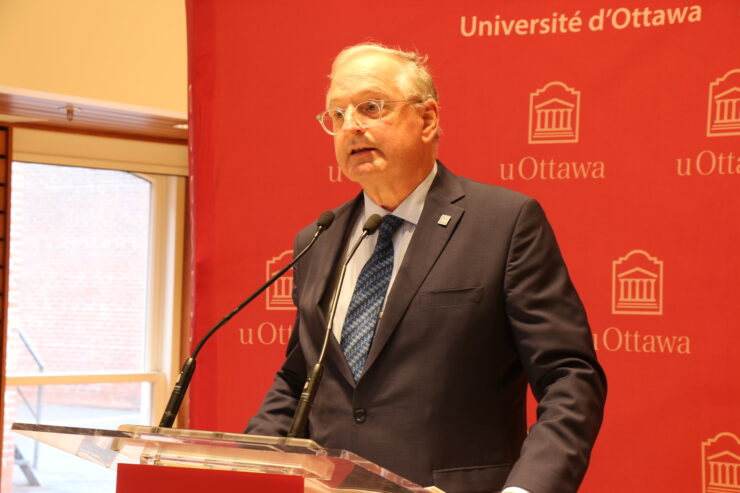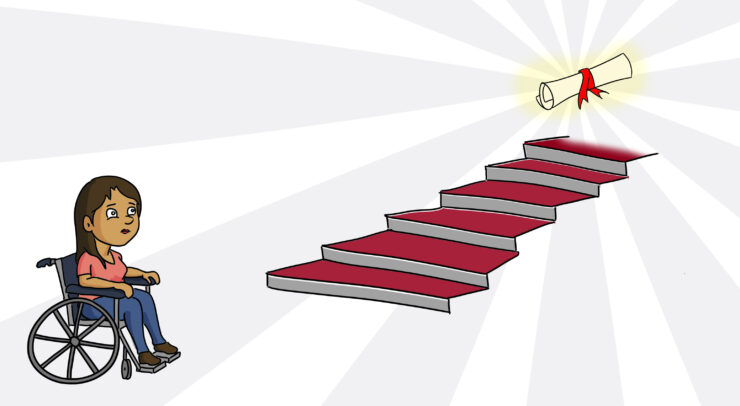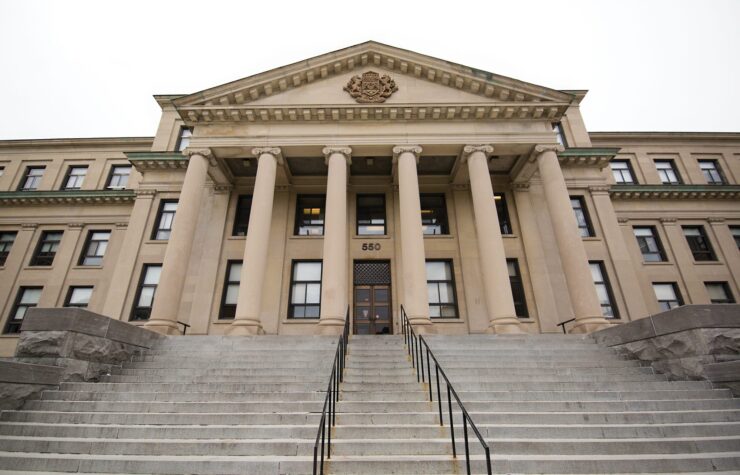A University of Ottawa professor and a PhD student who are both people of colour have shared their experience being carded by a campus security officer from 2017, an incident they say highlights the racism and especially anti-Black racism endemic in the university.
Amir Attaran, a law and medicine professor at the U of O who is Middle Eastern, posted a two-minute video he recorded of the experience from September 2017 to Twitter on June 13.
After University of Ottawa campus security carded and arrested black student @Jamal_KB, I’m posting video of security forcing into my office and carding me and my black PhD student @bumblebrie. I complained, but nothing was done about it. #racism @uottawa pic.twitter.com/23TxY8W9fa
— Amir Attaran (@profamirattaran) June 14, 2019
The video shows a white campus safety officer asking Attaran’s student Brieanne Olibris for identification inside her office space, which is connected to Attaran’s. Olibris is a Black PhD student researching reproductive health and the outcomes associated with assistive reproductive technologies.
Both Attaran and Olibris provided detailed accounts of the carding incident in phone interviews with the Fulcrum. The university has not responded to requests for comment on the incident.
According to Attaran, the security guard in the video entered his office without knocking and without permission and began asking for identification. When Attaran asked why, the officer said a 911 call was received from the office space, but Attaran had made no such call.
When Attaran asked Olibris next door if she had made the call she also said she hadn’t, but the officer began asking her for identification as well. The officer then cited university Policy 33, which governs security on campus, as a requirement for Olibris to show identification.
The policy says security is authorized to request identification from people on campus, but not necessarily demand it.
Olibris eventually showed the guard her student ID card and he left, but both Olibris and Attaran say they saw the experience as a microcosm of the wider anti-Black racism they see on campus. The officer is still employed at the university, according to the U of O’s employee directory.
“There was nothing about the interaction that made me doubt the fact that this was absolutely about the fact that we were not white,” Olibris said. “I frankly found the security personnel’s presence to be extremely threatening.”
Attaran later received the officer’s report, which he has shared with the Fulcrum.
“Attaran was extremely uncooperative with me the entire time and refused to adhere to campus policy,” the document reads.
“I would have let the whole thing go but they complained about me and I think from the video it’s clear my conduct is not the problem,” Attaran said.
That report spurred him to file a formal complaint with campus security with the help of the former dean of his faculty, but Attaran says he never received a response.
“That’s illustrative of the systemic racism at the university,” Attaran said.
Both him and Olibris point to alleged gaps in hiring people of colour to both faculty and staff at the university as another systemic issue on campus, among others.
Attaran said he decided to post the video after Jamal Boyce, a Black conflict studies and human rights student and vice-president academic and university affairs of the program’s students’ federation, shared his experience on Twitter being carded and handcuffed by campus security for over two hours on June 12.
“I’m angry more than saddened, but surprised? God no,” Attaran said, adding his goal was to draw as much attention as possible to Boyce’s experience.
After letting them know that i didn't have my wallet on me and trying to walk away they followed me, hit my phone to the ground as i tried to record, grabbed me and put me in handcuffs #blackoncampus @ctvottawa @uottawa pic.twitter.com/yQ7C7W2A1G
— Jamal (@Jamal_KB) June 13, 2019
While the U of O did not respond to requests for comment on Attaran and Olibris’ experience specifically, the university has launched an inquiry into Boyce’s interaction with campus security officers led by expert Esi Codjoe, a former vice chair of the Human Rights Tribunal of Ontario.
Codjoe will be asked to determine whether Policy 33 and the Trespass to Property Act were properly in Boyce’s case in accordance with both the law and human rights.
Codjoe will also look into campus security policies at large to determine whether they are up to date and “void of negative systemic impacts on any of our community members who belong to historically disadvantaged groups and specifically racialized community members,” the university said in a media release.
At a press conference on June 14, U of O president Jacques Frėmont said in French he was aware of Attaran and Olibris’ experience.
While Olibris and Attaran both view the inquiry as necessary and important, they point out major gaps in the university’s approach.
Both Attaran and Olibris say first and foremost, an apology to Boyce was in order.
“It should be beyond a no brainer for (Frémont) to say we are sorry for our security guards misunderstanding and misapplying Policy 33 and carding people, period,” Attaran said. “You don’t need an investigation to come to that point.”
“To not mince words, I’m actually disgusted by the response,” Olibris said of the lack of an apology.
“While I think we do need to take a look at wider human rights violations on campus and there are a lot of them … that dilutes the situation here,” she added. “By looking at human rights overall they are moving away from a very clear anti-Black racism issue on campus.”
Two open letters from professors are currently circulating condemning Boyce’s carding and handcuffing and calling for meaningful action to address systemic racism, while the University of Ottawa Students’ Union has called for Policy 33 to either be seriously reformed or abolished.





